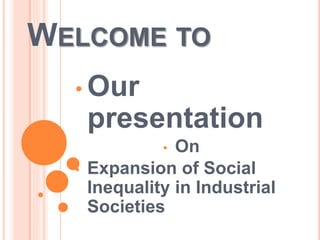
Social Inequality in Industrial Societies
- 1. WELCOME TO • Our presentation • On • Expansion of Social Inequality in Industrial Societies
- 2. OUTLINE Introduction Meaning of inequality History of industrialisation Questions about inequality Karl Marx’s view Bourgeoisie Proletariat Unequal terms in industrial societies People’s life style in industrial societies Influence of social inequality System contest of industrial societies Conclusion
- 3. INTRODUCTION
- 4. MEANING OF INEQUALITY Inequality means the unfair difference between group of people in society, when some have more wealth, status or opportunities then others. The term social inequality describes a condition in which members of society have different amounts of wealth, prestige or power. Inequality mainly refers economic inequality. [ Anthony Giddens, ‘Sociology’,7thedition, p.- 575]
- 5. HISTORY OF INDUSTRIALISATION The industrial mode of production began in England about 250years ago. This societies have existed only in the modern era, dating from the industrialisation of Great Britain in the late 18th century. The most advanced industrial societies today are found in North America, Europe and East Asia including Japan, Taiwan, Hongkong and South Korea. Countries such as India, Mexico, Brazil and some African countries have also become industrialised to a great extent. [Miller & Rorm, ‘Industrial Sociology’,2nd edition, p.-26]
- 6. QUESTIONS ABOUT INEQUALITY There are three questions about inequality to describe social inequality. 1. How much does inequality vary? 2. How do variations in inequality affect people’s lives? 3. How can variation in inequality be explained? [Louis Kriesberg, ‘Social Inequality’, p.-11]
- 7. KARL MARX’S VIEW: Marx characterized industrial society into two main vamps– owners and workers. Owners means – bourgeoise, industrialists, or capitalists. Workers means - proletariat, labour, or working class. [Anthony Giddens, ‘Sociology’,7th edition, p.- 575]
- 8. BOURGEOISIE: “ An economic system in which the means of production are held largely in private hands and the main incentive for economic activity is the accumulation of profits.” [ D. H. Rosenberg, 1991 ] In industrial societies – labours, factories, offices, machinery and any other instruments what are used in industry, owners of everything that is used for production in the industries, the class of the bourgeoisie. It can be said that working class or proletariat is a instrument of production in a industery. [ Anthony Giddens, ‘Sociology’ .7th edition, p.-487]
- 9. PROLETARIAT: “ I am being exploited by my boss.” This sentence is absolutely true for the relationship between owners and workers. Proletariat try to support their families through minimum-wage jobs. Then, proletariat works in factories, offices or industries in low income and lower position, prestige or status. Workers work in industry to use their individual ability to earn wealth and income for life support. Capitalists always exploit working class. The relationship between bourgeoisie and proletariat is an exploitative bond. [ Richard T. Schaefer, ‘Sociology’, 10th edition, p.- 186]
- 10. INEQUALITY IN INDUSTRIAL SOCIETY: Inequality trends in the industrial societies are four dimensions- 1. Income 2. Wealth 3. Occupation 4. Education [ Louis Kriesberg, ‘Social Inequality’ , p.-06]
- 11. 1.INCOME INEQUALITY: There is considerable income inequality in industrial societies. A group of workers in a clothing factory produce 100suits a day. Selling sixty suits covers the cost of paying workers wages and the cost of plant and equipment, so income from forty suits can then be taken as profit. It is a pure and huge income for owner. [Louis Kriesberg, ‘Social Inequality’ , p.-07]
- 12. 2.WEALTH INEQUALITY: Whole word’s wealth are controlled by some richest people. So, wealth typically more unequally distributed than income. in part because wealth closely associated with age (accumulation of possessions, equity, etc., over life course). historically trend of declining wealth inequality with industrialization. followed by recent inequality upswing. there is considerable income inequality in industrial societies. [Louis Kriesberg, ‘Social Inequality’ , p.-07]
- 13. 3.OCCUPATIONAL INEQUALITY social structure (in this context) = distribution of occupations at different levels of status. vertical mobility = movements of individuals within a system of stratification. upward vs. downward mobility = movement resulting in increase (upward) or decrease (downward) in status. inter- vs. intra-generational mobility: * inter-generational = movement between generations (e.g. occupation of son compared to occupation of father). * intra-generational = movement within single generation (e.g. current job compared to first job of same individual. [ Richard T. Schaefer, ‘Sociology’, 10th edition, p.- 183]
- 14. 4.EDUCATIONAL INEQUALITY capitalism → literacy, technical competence and child labor. education affects individuals with respect to. point of entry in career. chances for promotion. political influence (through use of expertise in government). effect of education on career entry & advancement similar in civilian & military sectors. [Anthony Giddens, ‘Sociology’ .7th edition, p.-874]
- 15. PEOPLE’S LIFE STYLES IN INDUSTRIAL SOCIETIES: Housing Dress Manner of speech Occupation Power Social respect Healthcare Other opportunities [ Miller & Rorm, ‘Industrial Sociology’,2nd edition, p.-73]
- 16. SOME SOCIAL UNEQUAL CONCEPT IN INDUSTRIAL SOCIETY: Social inequality in industrial society always exists within a social system – bounded, interrelated set of role, structures, or persons. It must be viewed within a system context because ranking are relative; references to “high” or “low” “up” or “down”, are meaningful only in the context of a set of persons or positions. [Louis Kriesberg, ‘Social Inequality’ , p.-25]
- 17. INFLUENCE OF SOCIAL INEQUALITY: Social inequality influences the world system. The decline in between- nation income inequality that began in the late twentieth century was caused by (1) deepening industrialization of poor nations, (2) growing economic integration that dissolves institutional differences between nations, (3) technological change that reduces the effects of labor immobility across national boundaries, and (4) a demographic windfall that has benefited some poor nations and promises to benefit others in the future. The growth in within-nation income inequality was caused by (1) the deepening industrialization of poor nations, by (2) the growth of the service sector, and by (3) the collapse of communism. [Firebaugh, 2008, p. 1049; numbers and emphasis added]
- 18. Conclusion